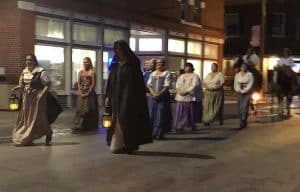History shapes views on Ukraine
Two days after Russia began its full-scale invasion of Ukraine, Kyiv resident Kateryna Pesotska called her father in Mariupol, recounting the destruction she witnessed.
He did not believe her.
Pesotska, who connected with the Republic-Times through a Future Leaders Exchange student who previously resided with a family who later moved to Waterloo, explained her father was openly “pro-Russian.”
Ukrainian independence and the country’s relations with Russian President Vladimir Putin were topics of contention between Pesotska and her father long before this recent Russian invasion began.
His beliefs, Pesotska said, contributed to him not believing what Pesotska was describing – air sirens, war crimes, newly dilapidated buildings and a mass exodus out of the capital city she so loved.
Yet, stories such as this are not uncommon.
Natalya Pruitt, a German teacher at Waterloo High School who identifies as “50 percent Ukrainian and 50 percent Russian,” has family trapped in Donetsk, a region often described as pro-Russian separatist.
Pruitt said she is completely against Putin and his invasion of Ukraine and sometimes has trouble navigating discussions of the war with her family. She said some people in Donetsk believe Ukrainians are perpetuating the violence they’re currently experiencing.
“Some people are so brainwashed that they praise Russians as liberators,” Pruitt said. “It’s crazy how distorted the picture is.”
Longtime Columbia resident Sergei Mali was born in Kazakhstan, studied at the Moscow School of Classical Ballet and served in the Soviet Military Army in the late 1980s before moving to the United States. He views the conflict in Ukraine very differently.
Mali said he supports Putin and Russia’s actions in Ukraine.
He compared the military operation to a soccer match where Russia is one team, the U.S. the other and Ukraine is being used as a soccer ball. He said the collapse of the Soviet Union in the early 1990s “created a vacuum of power and the U.S.A. filled it up, and now it’s getting pushed back.”
Mali, who ran for mayor of Columbia in 2005, cited alleged “money laundering” by Hunter Biden in Ukraine that former President Donald Trump wanted to investigate – along with a belief that President Barack Obama and his administration invested money into overthrowing the Ukrainian government and installing a pro-American government – to bolster his opinion.
“I love Russia like my mother, but I love the U.S.A. like my bride,” Mali said. “I’m in love with this country. I truly (am). But my love to this country does not make me accept everything in it and I want America to be less invasive with other parts of the world.”
The origins of these vastly different opinions plaguing families and nations can be understood through the lens of Russia’s and Ukraine’s intertwined history, and how narratives evolved during its course, said Sophia Wilson, associate professor of political science at Southern Illinois University Edwardsville and former Ukrainian Research Institute at Harvard University fellow.
After growing up in Ukraine and then coming to the U.S. for higher education, Wilson devoted much of her professional career to studying post-Soviet societies and Ukrainian revolutions.
Since 1991, when Ukraine declared its independence with the dissolution of the Soviet Union, the Russian government has tried to control Ukraine, Wilson said.
As Wilson explained, a primary point of Ukraine’s independence came in 2004 with the peaceful Orange Revolution, as protesters called into question problems such as rigged elections.
“As a result of those protests, the Supreme Court of Ukraine said there should be reruns of those elections, and that was when Ukraine became truly democratic,” Wilson said. “After that, elections that were held were free and fair according to the international observers, and that’s when pressure from Russia increased.”
Part of this pressure was through Russian propaganda that positioned “the love for Ukraine (to mean) nationalism,” Wilson said.
In 2013, the Maidan Revolution, or Revolution of Dignity, began. Many say it was sparked when then-president Viktor Yanukovych did not follow through with plans to sign an agreement that would bolster economic and political ties with the European Union, which many took to the streets to protest.
These soon turned deadly.
“Yanukovych was chosen through democratic means, but he then started using authoritarian methods of suppression including jailing and beating up and then eventually shooting the protesters who were resisting against those authoritarian methods,” Wilson said.
As a result of the revolution, Yanukovych was ousted and Putin annexed Crimea. Roughly half of the Donetsk region – where Pruitt’s family is – and Luhansk region became what is commonly described as “separatist,” yet Wilson said Russia ultimately exerted control over their governments “behind the scenes.”
“It is described as separatist, but that term is misleading because it suggests this kind of independence from Ukraine and independence from Russia. Without Russian security forces at first, without Russian weapons, without the Russian troops, they would not have been able to keep that independence,” Wilson said.
For example, these regions would hold elections but a guard – armed with guns supplied by the Russian military – would be looking over citizens’ shoulders to ensure they voted for the “right” choice, Wilson said.
Wilson said Russian propaganda ramped up in the wake of the Maidan Revolution.
“After the Maidan Revolution of 2014, the Russian propaganda became aggressive. (In propaganda), the Maidan Revolution was presented as if it was led by America, that it was an American-led coup that was also led by the Ukrainian fascists. That’s where the blatant lies began,” Wilson said. “In 2014, it became clear that Ukrainians wanted democracy, and therefore they wanted closer ties with the West and they wanted less ties with the Russian government. They did not want to stop the trade and relations with Russia, but they wanted the Russian pressure on the Ukrainian government to stop because the Russian government – it was understood – was only interested in the authoritarian government in Ukraine.”
Wilson said 60-70 percent of the Russian population bought into the propaganda that launched during this period.
Today’s Russian propaganda holds messages specific to the war, as much of it addresses images of modern destruction and civilians dying as “fake.” As Pruitt mentioned, destruction in Donetsk is often painted to be the product of Ukrainian aggression.
“They’ve been under attack for years and they cannot figure out who is doing it,” Pruitt said.
One pro-Russian piece of propaganda said Russians only attacked a maternity hospital in Mariupol because they said a far-right battalion with neo-Nazi links was hiding there.
Pesotska said upon seeing the reports, she knew it was not reality.
Tass, a Russian news agency, repeated the claim. It quoted Russian Foreign Minister Sergey Lavrov stating “all expectant mothers, all nurses and other personnel had been driven out” by the battalion.
Images show expectant mothers injured in the shelling. The Associated Press later reported one pregnant woman and her baby died.
Yet, the idea that the West is directly threatening Russia is a common thread, Wilson said.
“Nothing (Putin) says makes sense, but it’s very consistent,” Wilson said. “It’s consistent with the idea of presenting Russia as a victim, that supposedly NATO and America were presenting threats, that they were trying to invade Russia through Ukraine. Nothing can be further from the truth – neither Ukrainians nor Americans were ever interested in invading Russia. Both just wanted as little as possible to do with the Russian military.”
With Russian aggression in Ukraine growing, Putin’s approval rating is growing in Russia, repeating a pattern seen during the annexation of Crimea. Wilson noted that even though those in Russia and Russian-controlled areas have access to information sources beyond propaganda, many find it difficutly to accept they were lied to.
Additionally, she said a phenomenon called post-imperialist syndrome could also explain why many believe Russia is a victim of U.S. aggression and why they support Russia showing its strength through aggressive means.
“As many scholars pointed out, after the collapse of the Soviet Union Russia – unlike other Soviet republics – had a severe identity crisis because Russia was in charge, they were running the Soviet Union and Russia just like other post-imperial nations had post-imperialist syndrome,” Wilson said. “Their personal identity was tied into the concept of greatness that was associated with military strength, that was associated with others fearing Russia, and that’s why Putin’s propaganda worked – because the largest emphasis is placed on the made up idea that America is controlling Ukraine.”
Yet, hallmarks of imperialism such as violent invasions have the opposite effect on Russia’s neighbors, Wilson said.
“You could say in Eastern Ukraine there was some support for a Crimean scenario in 2014 because Russia was richer and because a lot of those people were listening to the Russian propaganda. They would watch Russian TV,” Wilson said. “However, as the Russian aggression grew, that support would decline further and further. Obviously when you’re bombed by the Russian forces, your opinion changes.”
Pesotska lost contact with her father and mother in early March. She doesn’t know if her dad was one of the many who changed his view of Putin when faced with the horrors of war.
“I hope so,” Pesotska said earlier this month.
Pesotska later learned her father died in Mariupol.






